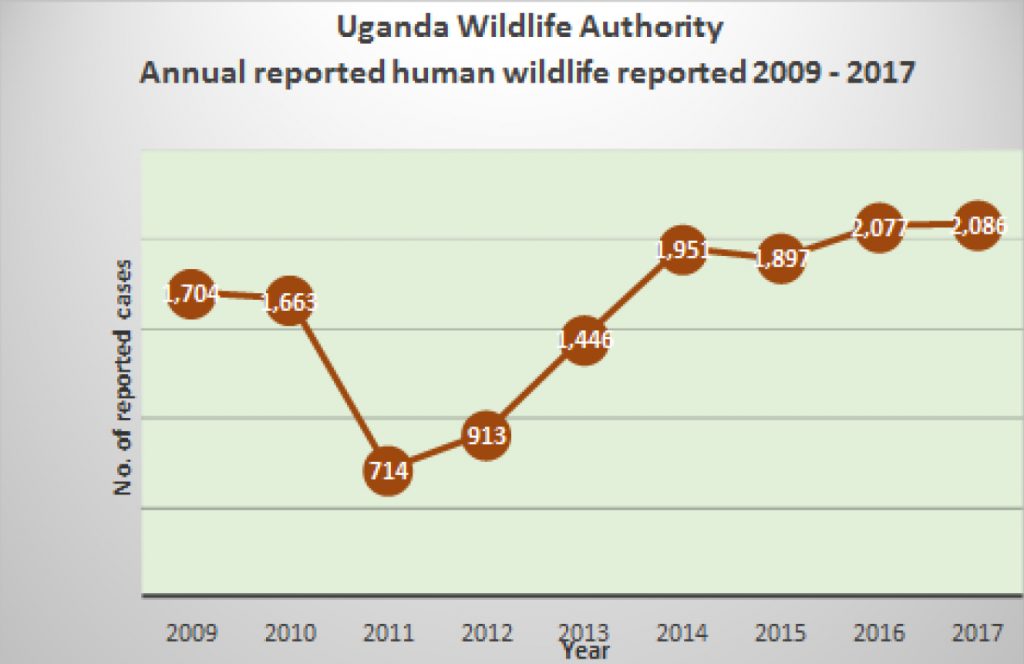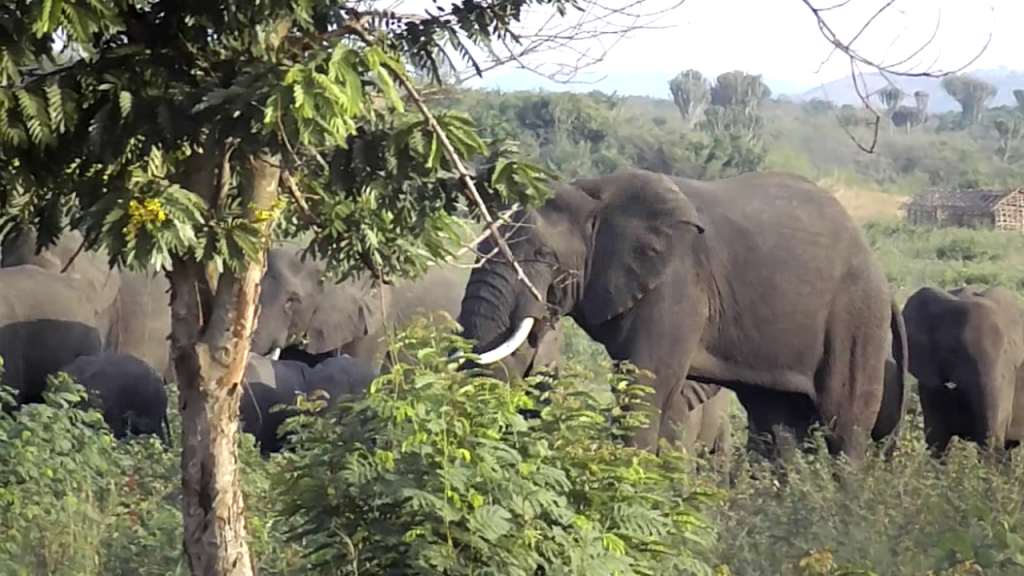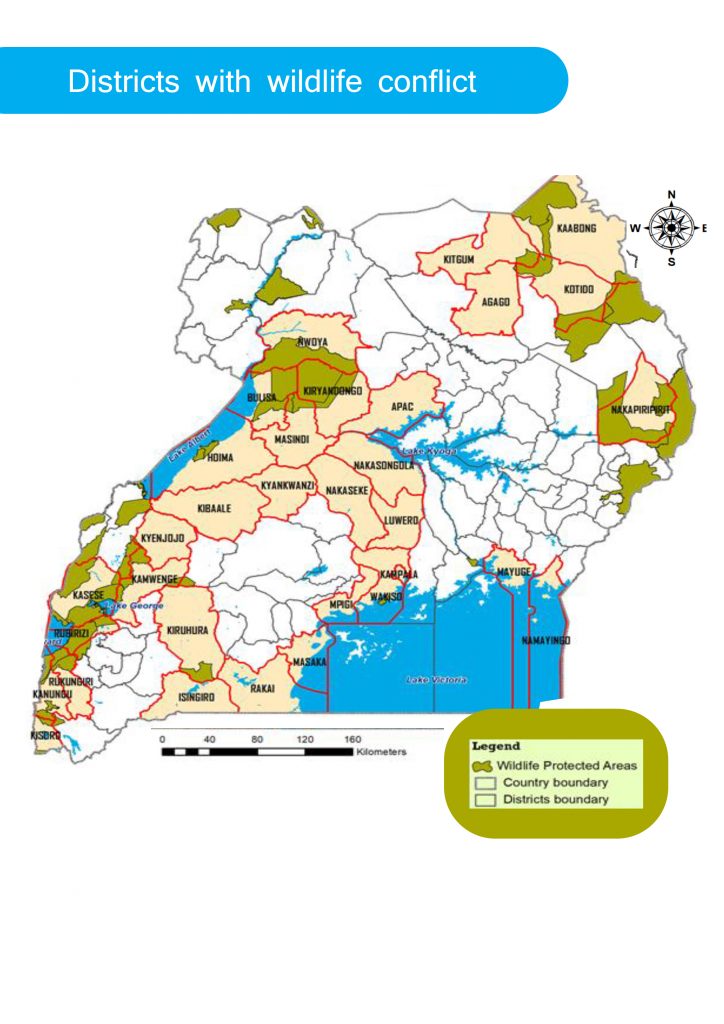BY INNOCENT KIIZA
Lions are classified as vulnerable or critically endangered species in the entire world, and yet Queen Elizabeth national park in Uganda’s western region continues to suffer rampant elephant and lion deaths.
On March 18, six climbing lions, a rare species of the big cat, were poisoned at Ishasha conservation area of Queen Elizabeth national park. Five days later, on March 23, authorities arrested four suspects on allegations that they were behind the killing of the six vulnerable female lions. They are Miliango Davi, 68, Tumuhire Vincent, 49, Aliyo Robert, 40, and Ampurura Brian.
The four suspects were found with three bottles containing a poisonous chemical identified as Furadan and a two-litre jerrican of lion fat oil, following a joint operation mounted both by the Police, the Army and officials belonging to the Uganda Wildlife Authority (UWA).
Furadan is a chemical pesticide which goes by the official name carbofuran, and is a highly toxic, granular pesticide that is applied to crops to protect them from pests. However, some individuals use it to kill lions and other wild animals.
The four suspects could now face life imprisonment, according to Ugandan law, if they are convicted of the charges.
The UWA Act stipulates that a person convicted of offences relating to the killing of protected species that are prescribed as threatened with extinction in the wild, critically endangered, or endangered, shall be liable to life imprisonment or to a fine not exceeding 10,000 currency point or both. One currency point is equivalent to Ushs20,000 ($5.6) and in this case, if convicted the suspects may also be fined Ushs200 million ($55,907).
This is not the first fatal incident involving the endangered lions in the Queen Elizabeth conservation area. Four years back at Hamukungu fishing landing site, Lake Katwe Sub County in Kasese district, 11 lions were suspected to have been poisoned after they allegedly ate a herd of cattle belonging to a Busongora pastoralist group.
As was the case with the March 18 incident in Ishasha, the authorities often go all out in search of those who commit the crimes. Two days after the latest killings, for instance, UWA announced a Shs10 million bounty of $2,795 for whoever would supply the clues for suspected killers.
Yet the losses that the country endures every time even one wild animal is killed are immense. According to the High-Level Panel Report on Illicit Financial Flows from Africa, Uganda loses an average of $509 million in illicit outflows per year.
Although there are no specific statistics on illegal wildlife trade in Uganda, a disrupting illegal wildlife trade financial investigative report lists illegal wildlife trade is the fourth largest illicit activity globally. It comes after drugs, arms, and human trafficking.
The illicit trade in wildlife threatens international security, national sovereignty, impoverished rural communities, and the existence of countless animal species from pangolins to elephants.
The continued poaching and illegal wildlife trade are endangering Uganda’s wildlife potential and the above activities seem difficult to eliminate completely due to international demand and the lucrative amounts of money on offer for wildlife products.
The value of Ivory on the world market costs between $2,000 (Ushs7,214,964) and $2,500 (Ushs9,018,705) per kilogram, according to Mr. Ian Muhimbise Rumanyika, the Assistant Commissioner Public and Corporate Affairs at Uganda Revenue authority (URA).
According to the Economic Development Africa Report 2020, Tourism is Uganda’s biggest foreign exchange earner at about $1.6 billion annually. And in 2019, Uganda collected Ushs105 billion ($29,351) from wildlife revenue, according to URA figures.
THE POACHERS’ DEN
Kitabu village which was recently upgraded to a sub county level and Nyakiyumbu sub county are some of the epicentres of poachers in Kasese. In 2013, the area lost seven men to illegal poaching in Queen Elizabeth national park.
Twenty-four-year-old Alice Mbambu, a wife to a poacher in Kitabu, says poverty is one of the reasons why they have been killing wild animals as a source of income for the last six years.
According to Mbambu, their financial fortunes changed for the worse in 2015 when they were frustrated by price inflation of cotton, their main source of income season to season. She said a kilogram of cotton could cost $0.42 (Ushs1500 shillings) and for one to get good money to support her basic needs, they had to cultivate acres and acres which was expensive for them.
However, once her husband joined other men in poaching wild animals, she says they started earning substantial amounts of money, which was sufficient to educate their children and support their family.

According to Mbambu, a kilogramme of elephant meat costs $1.39 (Ushs5,000), which is cheaper compared to beef meat that costs $4.16 (Ushs15,000).
Pio Mahembe, 63, the chairperson of Mitibiri trading Centre in Kitabu sub county, believes the government cannot do much to stop illegal poaching because earlier attempts have yielded nothing.
He says the government has failed to support and compensate those losing crops and relatives in the park, yet it keeps on sensitizing them about the need to protect animals without uprooting the core reason people keeps being hostile to wildlife.
“I can’t lose almost seven acres of cotton due to elephants and I take my complaints to UWA but all I get is nothing and the next day I again find it crossing my garden and I leave it. I would rather poison it and, I hear it die,” he revealed.
Mahembe alleged that when UWA finds a poacher in a park, they can even kill him and won’t even tell the public where their body is. However, when an elephant encroaches on human spaces and destroys people’s crops, the wildlife management body does not want anyone to harm them.
“Attempts have been made before, including arresting, and killing some poachers in the park, but nothing has changed. People are still going to the park to poach animals for food/meat consumption and others have taken poaching as a family business. There are now some families that we know that if we want any kind of wildlife meat, skin or skull you have to consult them,” he said.
A cotton farmer, Robert Kule, says that after several years of seeing his crops being destroyed by wild animals without receiving any compensation from UWA, he also turned hostile towards wildlife whenever they crossed into their gardens.
“I lost all my capital in 2006 after I had invested all the money, I had into cotton farming targeting fair prices since it was an election year. But all my hopes were swept away by seven elephants which invaded my five-acre gardens and destroyed everything. Attempts to report to UWA were made but since no single compensation was given to me, that is why you see me the way I am now,” Kule said, sorrow written all-over his voice.
Kule added that after complaining to UWA for compensation in vain, a man from the Democratic Republic of Congo (DRC) gave them tips on how to make rudimentary traps that could ensnare stubborn elephants.
“The traps were made from strong copper wires and were built by welding them with heavy metallic hooks,” Kule narrates.

Between 2018 and 2019, some 3,879 kilograms (kg) of ivory, 15 live pangolins, 487kg (about twice the weight of a large motorcycle) of hippo teeth, and 592 kg of pangolin skulls were seized at various commonly used exit points, including Entebbe airport and Mutukula border enroute Asian countries.
The continued poaching and illegal wildlife trade are endangering Uganda’s wildlife potential and the above activities seem hard to eliminate due to international demand and good offers of money for wildlife products.
In western Uganda’s wildlife corridor, which contains Queen Elizabeth National Park, Rwenzori National Park, Kibale National Park, Bwindi Impenetrable Forest Gorilla sanctuary and Lake Mburo National Park among others, Kihihi Sub County, Kitabu sub county level and Nyakiyumbu Sub County in Kanungu District are said to be the epicentre of poaching.
In 2013, when the area lost seven men to illegal poaching in Queen Elizabeth national park, those deaths seemed to have struck fear in the residents, leading to a reduction in poaching for a while. But the activity seems to be resuming, if the recent deaths of the tree climbing lions are anything to go by.
On 4th March, an elephant killed Johnson Mbusa, 59, a peasant farmer and a resident of Nyamirami village, Muhokya sub county in Kasese district while he was trying to protect his son who had been run over by a stray elephant that invaded his cotton garden.
Over the last ten years, the number of endangered species, including elephants, hippos, chimpanzees, and lions, have reduced from 600 to 460 species due to illegal wildlife trade attributes it to international high demands.
A Uganda wildlife trafficking assessment report released in 2018 named Uganda as one of the commonest transit points for wildlife products in the central and east African region, with poaching costing the country both in tourism revenue and illicit financial flows.
Queen Elizabeth conservation area that covers Queen Elizabeth National Park and Rwenzori Mountains National Park is one the areas that continues to suffer rampant cases of killing of animals.
Ernest Kasoke is the chairperson LC 3 for Muhokya Sub County where most poachers in Kasese district hail from.
According to Kasoke, culturally, the Bakonzo communities are poachers, and some believe wild animals belong to them despite the existence of the wildlife law which penalizes poaching. He revealed that cultural bakonzo used to stay on mountains and wildlife were like relatives that they lived with before parks were gazetted.

Kasoke was emphasizing that Bakonzos love for meat and cassava flour made them to co-exist with wildlife before wildlife products was on demand like these days forcing some people to poison them for money.
“Bakonzo could poach for food and that is when someone is hosting a visitor, where they could go and hurt Uganda Kob for food purpose, not now where people poison wildlife for money is available on market by dealers,’’ Kasoke said.
Section 30 (1), Cap. 200 of the Uganda Wildlife Act says a person who attempts to enter, enters, resides in, or attempts to reside in a wildlife protected area without permission by the Authority, commits an offence.
Kasoke says some wild animals are poisoned /killed by community members especially when they encroach into their crops. According to Kasoke, most hunters target the leopard and lion’s skin for business and other wild animal nails for medicinal purposes.
Kasoke says some poachers have links to intermediaries at the DRC- Uganda border and in Kampala who deal in ivory and pangolin skulls. They are the ones who connect them to multinational buyers abroad.
Mr. Bonny Mwesigwa, the head of Crimes Intelligence Department at Rwenzori East Regional Police Headquarters, revealed that illegal wildlife trade involves high level people from Kampala, including some in senior government positions, who deal directly with poachers and buy the illicit wildlife items directly from them using the foreign currency, especially dollars.
A case he insisted of the Special Force Commander (SFC) officers, Major Allen Rutagire and Corporal Collins Kamugisha, who were arrested in 2016 while selling 21.5 kilogrammes of pure elephant ivory.
SFC is a branch of the Uganda People’s Defence Forces (UPDF), which is in charge of protecting Uganda’s president, vice president and high-level installations across the country.
The Corporate Communications Manager at UWA, Bashir Hangi, confirms that illegal wildlife trade is a syndicate that involves international criminal dealers who deal with local intermediaries directly in country.
Hangi cited a recent April 2021 case where a retired Italian diplomat was arrested in Uganda with more than five kilogrammes of super ivory.
Mwesigwa said rampant illegal wildlife trade increased in 2015, 2016 and 2017 when 3-to-5 poachers could be arrested and prosecuted in courts of law and sentenced and others set free due to lack of evidence. He attributed the increase of illegal wildlife trade in the above years to elections since the country was focusing on presidential and parliamentary elections, leading to a relaxation in other areas.
Mwesigwa mentioned that in 2018, 11 lions were poisoned in Queen Elizabeth National Park under that same circumstance and case file number 09/11/04/2018 was recorded. However, the suspects were set free due to lack of evidence.
In the same development, 725 suspects were arrested, and 445 cases registered and prosecuted in courts where some culprits some were remanded, and others are still servicing their sentences in Luzira prison.
Pontus Onzima, the Chief Warden Queen Elizabeth National Park, says more than 60 poachers were arrested between March and May 2020 compared to 2016.
Onzima explains that most of the poachers target small wildlife species for food. He says the animal census scheduled next year will guide the park authorities on the extent of the damage.
Alice Natukunda, a community conservation warden at Rwenzori Mountains National Park, explains that at least every after three months, the park records the killing of one of wild animals, such as chimpanzees, baboons, elephants, bush pigs and monkeys by community members.
She attributes this to extreme poverty levels among the local population who resort to encroaching into the national park for meat both for consumption and economic purposes.
Natukunda admits that the park is losing resources and tourism potentials because most of the wild species are endangered by illegal poachers.
UWA’s Hangi says the Queen Elizabeth conservation area that covers Queen Elizabeth National Park and Rwenzori Mountains National Park is one the areas that continue to suffer rampant cases of killing of animals.
According to the Minister for Tourism, Wildlife and Antiquities, Godfrey Kiwanda Suubi, illegal wildlife trade rates are number three in the country after human trafficking and illegal drug trade. He added that, there has been regular intelligence surveillance and closer monitoring of potential targets in wildlife trade, which is helping the authorities to arrest and disband the illicit wildlife trade networks in Uganda.
Responding to issues of government big wigs involved in the illegal wildlife business, Hon. Kiwanda said there has been a lack of efficient evidence that pins some of the said officials but quickly added that those who have been netted live with ivory trucks have been prosecuted and some are serving sentences.
“No one is above the law and those special forces commanders (SFC) who were arrested with pure ivory trucks, President ordered to be prosecuted and serve their sentences which the court did,” he said.
Hon. Kiwanda revealed that international ivory dealers whom they arrest in act are deported and banned from re-entering the country.
He mentioned that his office has instructed the UWA to work on a magnification report on wildlife lost to illegal trade and verify how much the country currently has.
“Due to recent case of poisoning of six lions, I instructed UWA to give us an impact report on revenue on such acts, which I know they are working on,” Kiwanda said.
Lasting Solution to the illegal wildlife
According to Kiwanda, the government has undertaken many initiatives to ensure the conservation and sustainable use of wildlife resources.
These include boundary maintenance of national park to mitigate human wildlife conflict, institutionalization of the canine unit set up to combat poaching and illegal wildlife trade, continued community engagement through provision of technical, financial, and scholarly support to communities around the national park, as well as to end strangers accessing specify species in the protected areas.
Kiwanda said the ministry of tourism and UWA are working together to set up barriers on the park boundaries consists of an electric fence that is 255 kilometres long, 8,850 beehives, boardwalks and supporting community with chili seedlings and other high value crops to plant on their garden boundaries for both scaring elephants and as well as for income generation.
Hangi said creating awareness among the communities around the national parks about the importance and values of wildlife and capacity building in communities by employing some of them as scouts and whistle-blowers. He added that they are also giving a part of the revenue from tourism directly to communities to undertake projects that will improve their lives and dissuade them from poaching.
Reporting for this story was supported by Internews’ Earth Journalism Network
